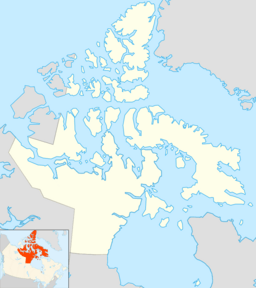Aston Bay facts for kids
Quick facts for kids Aston Bay |
|
|---|---|
| Location | Peel Sound |
| Coordinates | 73°45′N 095°10′W / 73.750°N 95.167°W |
| Basin countries | Canada |
| Settlements | Uninhabited |
Aston Bay is a waterway located in the Arctic, far up north in Canada. It is part of a larger body of water called Peel Sound. You can find Aston Bay on the western side of Somerset Island. It is also just north of M'Clure Bay. The closest town to Aston Bay is Resolute. Resolute is about 150 kilometers (93 miles) away. It is located on Cornwallis Island.
Contents
What is Aston Bay?
Aston Bay is an arm of Peel Sound. This means it is a smaller part of the larger water area. It is located in the Qikiqtaaluk Region of Nunavut, Canada. Nunavut is one of Canada's three territories. It is a very large area with a small population.
Where is Aston Bay Located?
Aston Bay is in a very remote part of the Arctic. It is surrounded by cold waters and land that is often covered in ice. The area around Aston Bay is not home to any people today. It is an uninhabited place.
What's Special About Aston Bay's Land?
The land around Aston Bay holds some interesting secrets. There is a special area on a peninsula that sticks out into the bay. This area has valuable minerals like zinc and silver. These minerals are found close to the tidewater. Tidewater is the part of a river or bay that is affected by the ocean's tides.
Who Lived Here Long Ago?
Aston Bay has a long history. Scientists have found old archaeological sites in the area. These sites show that people lived here many years ago.
Early Arctic Settlers
Some of the oldest sites belong to the Early Arctic Small Tool Tradition. These were groups of people who lived in the Arctic thousands of years ago. They were known for making small, sharp tools from stone. These tools helped them hunt and survive in the harsh Arctic environment.
The Thule People
Later, the Thule people also lived in the Aston Bay area. The Thule people are the ancestors of today's Inuit people. They were skilled hunters and builders. They built large houses made of stone and whalebone. They were also very good at hunting large marine animals like whales. Finding their sites helps us learn about how people lived in the Arctic in the past.


